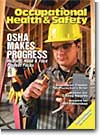
March 2003
Features
By Kris Bancroft
THIS is the fourth in the series of articles on welding safety. The central theme of these articles has been to emphasize that welding, if mastered and performed safely, is a rewarding profession, and that safety is an integral part of producing professional results.
By Mark H. Stromme
EVEN though the OSHA flammable and combustible storage regulations at 29 CFR 1910.106 have been around for 30 years, there is still confusion about exactly how to comply with the requirements.
By Barrett Miller
SEX sells products, but when it comes to moving merchandise, nothing beats fear. It's a painful reality of modern marketing: If you can create an atmosphere of fear, the product that takes away the immediate anxiety sells. This principle applies to everything from underarm deodorant to floor care products.
By Alan Matta
FIRST responders have the perilous task of stepping straight into hell--whether it's a burning building, toxic chemical spill, radiological disaster, or other hazardous materials situation. In these environments, first responders can take steps to protect themselves against known compounds, but the most dangerous threat is always the unknown.
By Hector V. Pazos
GIVEN the exposure to the marine environment and the motions of a vessel, slips and falls are a significant source of personal injuries among employees on floating equipment, probably substantially greater than for most industry groups.
By Joe Teeples, MBA
WHEN terrorists attack, the President of the United States is sent to an "undisclosed location" for protection. The Vice President of the United States is sent to a different "undisclosed location." In England, the Queen has ordered a high-tech "panic room" to be built inside Buckingham Palace.
By Fred Elliott
EVERY day, workers in many locales are injured--including quite a few who are left with permanent disabilities--because they did not wear adequate eye and face protection. Or because they wore inadequate protection, the result of being poorly trained or not trained at all.
By Bill Weems, Phil Bishop
I was surprisingly comfortable with my legs dangling relaxed beneath me, and my arms outstretched in a posture that must have resembled a crucifixion. I had no feeling of stress and mused as to why this was considered dangerous.
By John Ford
IMPLEMENTING lockout/tagout on a machine is relatively simple: Just identify all of the energy sources, isolate the energy sources by turning off and or blocking or bleeding them, lock and tag the energy sources, verify it is locked out, and then do the work that needs to be done.
By Lee D. Hager
AFTER a long period of dormancy, federal OSHA has picked up activity in the area of hearing loss prevention rulemaking. Activity is focused in the areas of recordkeeping and hearing conservation in construction.
Departments
By Valerie Weadock
IN a perfect world, every company large or small would have a trained professional on staff to evaluate and solve ergonomic problems. But in the real world, the responsibility often falls in the hands of someone with little formal training.
By Janet Iachini, M.Ed., ASCM/HFI
AN employer of any size is always seeking a way to reduce the costs associated with absenteeism, injuries, worker's compensation claims, insurance claims, and/or poor morale. With our aging workforce and the natural risks associated with aging, time and efforts may seem fruitless.
By Jerry Laws
NEWS flashes from the convention front lines are not encouraging. If the meetings industry's own forecasts and experts are correct, a senseless building boom of U.S. convention centers will continue through 2007 at least.